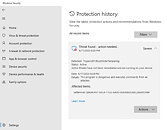Raevenlord
News Editor
- Joined
- Aug 12, 2016
- Messages
- 3,755 (1.22/day)
- Location
- Portugal
| System Name | The Ryzening |
|---|---|
| Processor | AMD Ryzen 9 5900X |
| Motherboard | MSI X570 MAG TOMAHAWK |
| Cooling | Lian Li Galahad 360mm AIO |
| Memory | 32 GB G.Skill Trident Z F4-3733 (4x 8 GB) |
| Video Card(s) | Gigabyte RTX 3070 Ti |
| Storage | Boot: Transcend MTE220S 2TB, Kintson A2000 1TB, Seagate Firewolf Pro 14 TB |
| Display(s) | Acer Nitro VG270UP (1440p 144 Hz IPS) |
| Case | Lian Li O11DX Dynamic White |
| Audio Device(s) | iFi Audio Zen DAC |
| Power Supply | Seasonic Focus+ 750 W |
| Mouse | Cooler Master Masterkeys Lite L |
| Keyboard | Cooler Master Masterkeys Lite L |
| Software | Windows 10 x64 |
Microsoft has announced an extension to the Windows Defender System Guard which will allow it to also verify and guarantee integryity of systems at a UEFI BIOS level. Citing an increase in hardware and firmware-level attacks over the years, the extended protection functionality aims to guarantee protection across the entire hierarchy of a device, from firmware up through to cloud processing.
The UEFI scanner is a new component of the built-in antivirus solution on Windows 10 and gives Microsoft Defender ATP the unique ability to scan inside of the firmware filesystem and perform security assessment. Working in conjunction with your systems' chipset, the UEFI scanner features a three-pronged solution to firmware security: UEFI anti-rootkit, which reaches the firmware through Serial Peripheral Interface (SPI); Full filesystem scanner, which analyzes content inside the firmware; and a Detection engine, which identifies exploits and malicious behaviors.



This new tool aims to increase odds of detection for devices whose boot has already been compromised by rootkits or other kind of malware acting at the firmware level. The idea is to keep your boot flow secure and trustworthy, something that will almost certainly be rendered impossible by a rootkit messing with OS and software protection privileges to keep escalating their control over your machine.

View at TechPowerUp Main Site
The UEFI scanner is a new component of the built-in antivirus solution on Windows 10 and gives Microsoft Defender ATP the unique ability to scan inside of the firmware filesystem and perform security assessment. Working in conjunction with your systems' chipset, the UEFI scanner features a three-pronged solution to firmware security: UEFI anti-rootkit, which reaches the firmware through Serial Peripheral Interface (SPI); Full filesystem scanner, which analyzes content inside the firmware; and a Detection engine, which identifies exploits and malicious behaviors.



This new tool aims to increase odds of detection for devices whose boot has already been compromised by rootkits or other kind of malware acting at the firmware level. The idea is to keep your boot flow secure and trustworthy, something that will almost certainly be rendered impossible by a rootkit messing with OS and software protection privileges to keep escalating their control over your machine.

View at TechPowerUp Main Site







 Way better than the trash GSuite that Google was attempting to deal to us. We have an internal Outlook add-in (or add-on according to Google) that we need to integrate for all faculty and staff members and they said its not possible to convert because they want us to conform to their "Build cards" thing. Our CIO obviously said no.
Way better than the trash GSuite that Google was attempting to deal to us. We have an internal Outlook add-in (or add-on according to Google) that we need to integrate for all faculty and staff members and they said its not possible to convert because they want us to conform to their "Build cards" thing. Our CIO obviously said no.